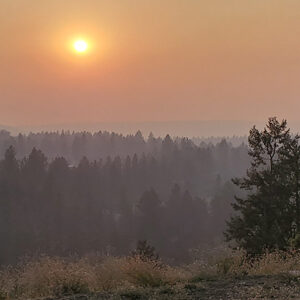
Joint Release: Air quality expected to worsen due to wildfire smoke; Saturday and Sunday could reach very unhealthy to hazardous levels
Media Contacts:
Lisa Woodard, Spokane Regional Clean Air Agency | 509.863.8263
Kelli Hawkins, Spokane Regional Health District | 509.994.8968
SPOKANE, Wash. – Smoke from wildfires will continue to cause hazy skies and by Friday afternoon air quality could reach the Unhealthy for Sensitive Groups or worse on the Air Quality Index (AQI), according to the Spokane Regional Clean Air Agency (Spokane Clean Air).
"Air quality is expected to worsen over the weekend, prompting the Washington State Department of Ecology to issue a statewide Air Quality Alert," said Lisa Woodard, communications & outreach manager for Spokane Clean Air. "Air quality in the Spokane area could reach very unhealthy to hazardous Saturday and Sunday," added Woodard.
"It is vital that individuals check current air quality conditions and take the necessary steps to protect their health. Inhaling smoke is not good for anyone, even healthy people. If you are in a vulnerable group, inhaling wildfire smoke is especially harmful," said Dr. Bob Lutz, health officer with Spokane Regional Health District (SRHD).
People most likely to have health problems from breathing smoke include:
- Persons with, or recovering from, COVID-19
- People with lung diseases (asthma, COPD, bronchitis, emphysema)
- People with respiratory infections
- People with existing heart or circulatory problems
- People with a prior history of heart attack or stroke
- Infants and children under 18
- Older adults (over age 65)
- Pregnant women
- People who smoke
- People with diabetes
“People in high-risk groups need to follow their breathing management plans, keep medications on hand and contact their health provider if necessary," said Dr. Lutz.
According to DOH, some respiratory symptoms including cough, sore throat, and difficulty breathing, are common to both wildfire smoke exposure and COVID-19. Other smoke-related health effects include:
- Coughing, scratchy throat, irritated sinuses, shortness of breath, chest pain, headaches, stinging eyes, and runny nose.
- If you have heart or lung disease, smoke might make your symptoms worse.
- People who have heart disease might experience chest pain, a rapid or irregular heartbeat, shortness of breath, and fatigue.
- If you have a pre-existing respiratory condition such as asthma, COPD (including chronic bronchitis and emphysema), or allergies, smoke may worsen symptoms (inability to breathe normally, cough with or without mucus, chest discomfort, wheezing, and shortness of breath).
- Seek medical attention when experiencing severe symptoms, such as chest pain or difficulty breathing. Dial 911 for emergency assistance if symptoms are serious.
- If you have a fever, cough, or shortness of breath, it is best to treat it like it could be COVID-19. Protect others by staying home. If you are concerned about your health, call your health care provider to discuss COVID-19 testing and other possible reasons for your illness.
Reduce your exposure to smoke:
- Check local air quality reports at www.SpokaneCleanAir.org and listen to news or health warnings for your community. The AQI categories and recommended actions are here.
- The best way to protect you and your family this year will be to stay indoors and keep indoor air as clean as possible. It might not be safe to go to public spaces to seek cleaner and cooler indoor air away from home this year due to COVID-19. With the congregation of people at these settings, there is an increased risk of COVID-19. Check in advance to see if these places are open and be prepared for lower capacity, to physically distance, and wear a cloth face covering.
- Avoid physical exertion outdoors if smoke is in the air.
- Keep windows and doors closed. Track the air quality and open your windows for fresh air when the air quality improves. Pay attention to the heat indoors. if you don't have air conditioning and it's getting too hot, seek shelter a family member's home. If not an option, seek relief somewhere where you can social distance.
- Improve the filtration in your home. Run an air conditioner, set it to re-circulate and close the fresh-air intake. Make sure to change the filter as the manufacturer recommends. It may fill faster when smoke is prolonged.
- Create a “clean-air room” in your home using a HEPA filter and change the filter more often when it’s smoky. Some room air cleaners can help reduce particulate levels indoors, as long as they are the right type and size for your home. If you don’t have a HEPA filter, here is a link to a short video on how to make a DIY box fan filter.
- Avoid adding to indoor pollution. Don’t smoke or use candles, incense, sprays, fireplaces, or gas stoves. Don’t broil or fry food. Don’t vacuum unless your vacuum has a HEPA filter, because vacuuming stirs up particles already inside your home.
More information/Resources:
- Spokane Regional Clean Air Agency's Wildfire Smoke web page
- Spokane Regional Health District's Wildfire Smoke FAQs
- Six minute interview video clip for news media, featuring local air quality and health experts. Washington State Department of Health's web page on Wildfire Smoke/COVID and Your Health
